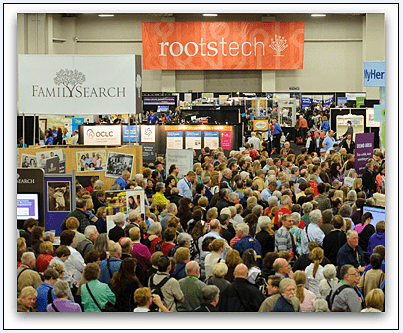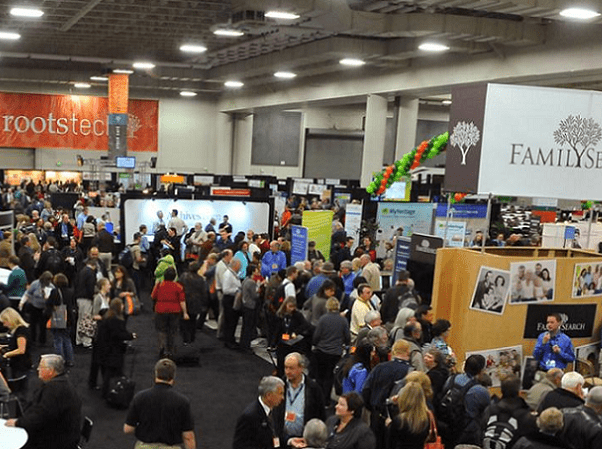Introduction: In this article, Mary Harrell-Sesniak – who has attended many genealogy conferences – provides some tips to prepare for and enjoy the next genealogy conference you attend. Mary is a genealogist, author and editor with a strong technology background.
Are you planning on attending the upcoming RootsTech genealogy conference in Salt Lake City, Utah, 3-6 February, 2016? Or perhaps another genealogy conference later this year? If so, this article provides some tips to help you get the most out of whatever family history conference you attend.

There are a few pilgrimages diligent genealogists take. Among them are:
- Visiting cemeteries
- Touring ancestral homelands
- Researching at renowned libraries
- Researching at state and national archives
- Attending national genealogy conferences
All of these are exciting options, but the last choice is high on my list. Genealogy conferences are always exciting to attend. My experience is that they leave me refreshed and enthused about tackling portions of my family tree that need to be addressed.
If you’ve never attended a genealogy conference, this list is typical of what you can expect:
Preregistration
Register early, so that you can take advantage of early bird discounts. Information may be sent electronically or in the mail. Hotels may fill too, so if you wish to find one in close proximity do not delay. Many attendees reserve rooms a year in advance. They also reserve special events, such as dinners and classes.
Registration
Once you have arrived, get in the appropriate line to register. You’ll be given a name tag or other ID to get you into the event and exhibits. Some provide a holder and strap so it will hang around your neck.
Name Tags
If you subscribe to, or are a member of, a well-known genealogy organization, you may be given labels to attach to your credentials. Don’t be surprised to see people adorned with a half dozen or so examples of genealogical bling (i.e., things to attach to the name tag).
The Keynote Speech
The opening gathering will feature one or more keynote speakers. This is where you’ll hear first hand what’s on the mind of the great minds.
Not every keynote speaker will be a genealogist – but expect someone prominent. It may be a historian, CEO or renowned author. Sometimes there will be more than one, so arrive early to get a good seat. Sometimes you will be treated to exciting announcements and information about the latest trends affecting family history research.
Handouts
Most national conferences offer a syllabus. It may be printed, recorded on a DVD or thumb drive, or downloadable in advance. If you are fortunate to receive it in advance, do your homework so that you can decide which presentations you wish to attend.
Speakers are required to create their handouts well in advance, but occasionally there will be changes. Be prepared to take notes and gather any additional materials within each setting.
Presentations
This is where you’ll have to make some tough decisions. Smaller conferences may require you preregister for a presentation, but larger ones generally do not. The more popular speakers will be placed in the larger rooms. Many fill up and doors may be closed promptly once they reach standing-room-only capacity, so do not be late.
Regional Considerations
Some conventions follow themes. Others offer in-depth looks at regional issues, which is a real boon if held in an area of ancestral interest.
Classes
To come up to speed on a special topic, look for a class. Some are elementary and others are at the advanced levels.
Generally, classes are taught by accredited or certified genealogists who are at the top of their field. Some may charge for classes and most require preregistration. My recommendation is that the price is generally worth it if you want to become knowledgeable in a topic.
Families, Languages and Ethnic Considerations
Some conferences are limited to specific age groups, but a growing trend is to include family-friendly days. Genealogy is also becoming more diversified, so don’t be surprised to see programs with a multicultural approach or even in a foreign language.
Entertainment, Tours, Parties and Dinners
Entertainment and tours of local venues may be offered. I’ve been treated to choirs, scanning demonstrations and tours of industry headquarters. These can be a highlight of your event.
Not everyone will be invited to invitation-only parties. However, if you are an officer of a prominent organization or well known in your field, you may receive an invite – so pack proper attire.
During the day, there will be a limited amount of food for purchase in the exhibit halls. A nicer option would be to attend a banquet or dinner with a speaker program. Reservations will be required, as well as advanced fees. Many sell out early, as attendees tend to find these enjoyable.
Vendor Exhibits
One of the most fun places in a conference is the exhibit hall.
Here is where you will network with known and unknown companies, watch sales demonstrations, learn about the newest and greatest innovations, enter drawings for freebies, and purchase books and other materials.
You never know whom you’ll run into on the floor. You might just meet one of your favorite bloggers, an interesting author, or the CEO of a well-known genealogy company.
Closing Presentation
Due to flight schedules and long drives home, many elect to miss the closing ceremony – but if possible, stay to the very end. There are often interesting recaps and information that was not shared earlier. And don’t forget to go back into the conference hall. Vendors may not wish to take everything back with them!
Conference Tips
- Take comfortable walking shoes. The exhibit hall may be hard concrete and you can expect to walk long distances between presentations.
- Wear a backpack or carry a durable tote bag.
- A notepad & pencil, tablet or laptop is essential for taking notes. A thumb drive, smart phone or camera may also be useful.
- Some attendees will pull a roller board behind them to accommodate all of the materials.
- Even if you are not connected with an organization, personal business cards are handy to exchange info or to use in a drawing.
- Take along a snack and water bottle. Food choices may be limited and the fast food lines may be long.
- If you are attending a winter conference, there may be a checkroom for coats and other items.
- WIFI may be available, but if everyone is online at the same time, you may have issues.
- Some venues offer shipping services. This is a great idea to keep your luggage manageable.
Can’t Make the Conference?
Many genealogy conferences allow family historians to attend sessions virtually via a home computer – and if they are recorded, many sessions are available for purchase. It’s always great to revisit a favorite presentation or review a class you weren’t able to attend in person.
Are You Attending the RootsTech Genealogy Conference?
GenealogyBank is helping to sponsor the upcoming RootsTech conference in Salt Lake City, Utah, 3-6 February, 2016. If you’re attending, come visit us at booth #523 to discuss genealogy in general, or any specific questions you have about your own family history research.
For more information about RootsTech, visit the website at: http://www.rootstech.org/?lang=eng
Related RootsTech Article:
